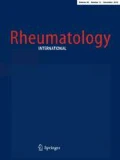Abstract
The objective of this study was to perform a longitudinal follow-up of antinuclear antibodies (ANAs) and anticardiolipin antibodies titers (aCL) throughout pregnancy in a group of patients with systemic lupus erythematosus (SLE) and antiphospholipid syndrome (APS) patients during their therapy for the prevention of fetal loss and to examine their relationship with pregnancy outcome. Thirty patients and 15 controls were followed in the study. Fifteen patients had SLE (group I) and 15 had APS (group II, of which seven patients had primary APS and eight had APS secondary to SLE). All patients were receiving therapy for the prevention of fetal loss with prednisone and aspirin as part of an ongoing clinical trial in lupus pregnancy. If there was a history of previous thrombosis, heparin was added. Blood samples were taken at the 1st, 2nd, and 3rd trimesters (T) of pregnancy in order to assess the presence of IgG and IgM aCL antibodies (ELISA), anti-dsDNA (C. luciliae) ANAs (HEp-2 cells), and immunospecific antibodies (antiextractable nuclear antigens). We collected 90 samples from patients and 45 samples from healthy controls. Group I (SLE) ANAs were positive in 100% during the 1st T, 67% in the 2nd T, and 67% in the 3rd T, with various immunofluorescence patterns. In five patients, aCL antibodies were detected without a history of APS (one in 1st T, three in 2nd T, and one in 3rd T). Fetal loss was observed in two patients, in one of whom it was associated with nephritis, high titers of ANAs, and anti-dsDNA. Another patient had pulmonary hemorrhage with anti-dsDNA and aCL. In group II, all but one patient with primary APS were negative to ANAs. In secondary APS, by contrast, 6/8 patients (75%) had positive ANAs at least during the 1st T. All seven patients with primary APS and 6/8 with secondary APS had aCL during pregnancy. In 9/15 (60%) patients from the APS group with a history of previous fetal loss, aCL became negative during pregnancy and they had live births. The disappearance of aCL was associated with improved fetal survival (relative risk, or RR, 0.67). ANAs in the control group were positive in 7% at low titers, and all of them were negative for aCL. Despite treatment, ANAs are prevalent during pregnancy in SLE patients and APS secondary to SLE. During pregnancy in SLE, aCL titers may appear. Decreasing titers and/or disappearance of aCL correlated with improved fetal prognosis in a subset of patients with APS.
Similar content being viewed by others
Author information
Authors and Affiliations
Additional information
Electronic Publication
Rights and permissions
About this article
Cite this article
Salazar-Páramo, M., Jara, L.J., Ramos, A. et al. Longitudinal study of antinuclear and anticardiolipin antibodies in pregnant women with systemic lupus erythematosus and antiphospholipid syndrome. Rheumatol Int 22, 142–147 (2002). https://doi.org/10.1007/s00296-002-0207-x
Received:
Accepted:
Published:
Issue Date:
DOI: https://doi.org/10.1007/s00296-002-0207-x




